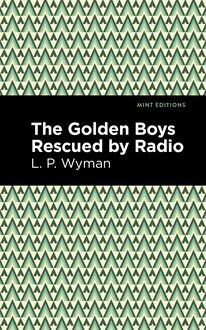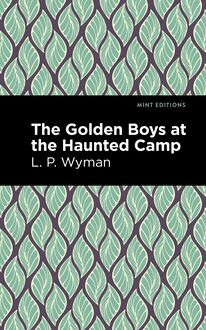-
 Univers
Univers
-
 Ebooks
Ebooks
-
 Livres audio
Livres audio
-
 Presse
Presse
-
 Podcasts
Podcasts
-
 BD
BD
-
 Documents
Documents
-
- Cours
- Révisions
- Ressources pédagogiques
- Sciences de l’éducation
- Manuels scolaires
- Langues
- Travaux de classe
- Annales de BEP
- Etudes supérieures
- Maternelle et primaire
- Fiches de lecture
- Orientation scolaire
- Méthodologie
- Corrigés de devoir
- Annales d’examens et concours
- Annales du bac
- Annales du brevet
- Rapports de stage
La lecture à portée de main
Vous pourrez modifier la taille du texte de cet ouvrage
Découvre YouScribe en t'inscrivant gratuitement
Je m'inscrisDécouvre YouScribe en t'inscrivant gratuitement
Je m'inscrisEn savoir plus
Vous pourrez modifier la taille du texte de cet ouvrage
En savoir plus

Description
The Golden Boys and Their New Electric Cell (1922) is an adventure novel by L.P. Wyman and one of seven books in his vastly underrated—and relatively unknown—Golden Boys series.
Each novel follows the adventures of Bob and Jack Golden, brothers from Maine with curious minds and adventurous hearts. Together, often alongside their trusted friend Rex Dale, the Golden Boys use their problem-solving skills and wilderness experience to overcome danger, discover strange places, and grow into fine young men.
Hard at work in their state-of-the-art laboratory, the Golden Boys invent a powerful electric cell. Realizing it works exceedingly well, they soon turn their thoughts to the annual motorboat race, held on the nearby Hayden Lake, and only days away. Thinking of the glory awaiting them should they win, Jack and Bob Golden devote themselves to attaching their new electric cell to their boat, the Sprite’s, motor. Meanwhile, the Jenkins boys, who hope to take the race for themselves in their boat, the Winner, have been doing their best to spy on the brothers and their invention. As the day of the race finally arrives, the Golden Boys must overcome their nerves, as well as best the Jenkins brothers’ attempts at cheating, in order to claim victory. Although they win, their pride soon disappears—news of the electric cell has spread, and Bob is kidnapped in an attempt to steal the design! The Golden Boys and Their New Electric Cell is a story of twists and turns with a message of perseverance and a passion for adventure.
L.P. Wyman’s The Golden Boys and Their New Electric Cell is the work of a talented author. It is a timeless tale inspired by Wyman’s experience as a chemist, and is both easy to read and difficult to put down. Published several years before the debut of The Hardy Boys series, which would dominate young adult fiction for decades to come, The Golden Boys series is long overdue for the attention and appreciation it deserves. Although originally published for an audience of teenage boys, Wyman’s series is perfect for children of all ages and genders, as well as for adults looking to return to the simple, exciting fiction of their youth.
With a beautifully designed cover and professionally typeset manuscript, this edition of L.P. Wyman’s The Golden Boys and Their New Electric Cell is a newly unearthed classic of young adult literature reimagined for modern readers.
Sujets
Informations
| Publié par | Mint Editions |
| Date de parution | 01 décembre 2020 |
| Nombre de lectures | 0 |
| EAN13 | 9781513265346 |
| Langue | English |
| Poids de l'ouvrage | 1 Mo |
Informations légales : prix de location à la page 0,0450€. Cette information est donnée uniquement à titre indicatif conformément à la législation en vigueur.
Extrait
The Golden Boys and Their New Electric Cell
L.P. Wyman
The Golden Boys and Their New Electric Cell was first published in 1923.
This edition published by Mint Editions 2020.
ISBN 9781513264660 | E-ISBN 9781513265346
Published by Mint Editions®
minteditionbooks.com
Publishing Director: Jennifer Newens
Design & Production: Rachel Lopez Metzger
Typesetting: Westchester Publishing Services
C ONTENTS 1. T HE N EW C ELL 2. J ACK T AKES A B ATH 3. T HE S TOLEN C AP 4. T HE T RY -O UT 5. T HE R ACE 6. S OME O NE E LSE T AKES A B ATH 7. B OB D ISAPPEARS 8. B OB E SCAPES —A LMOST 9. O N THE R OAD TO B OSTON 10. T HE D ETECTIVE A RRIVES 11. J ACK IN T ROUBLE 12. B OB B EGINS W ORK ON A F AKE C ELL 13. B OB ’ S E SCAPE 14. O N THE K IDNAPPER ’ S T RAIL 15. T HE C OUNTERFEITER ’ S D EN 16. B UT THE B IRDS HAD F LOWN 17. T HE N EW E LECTRIC M OTORCYCLE 18. B OB AND J ACK GO ON A H UNT 19. T HEY F IND THE H OUSE BUT L OSE A C AP 20. B OB AND J ACK R ETURN FROM THE H UNT 21. B OB AND J ACK T HINK THEY HAVE A C LUE 22. T HE C HASE 23. T HE R OUND U P 24. C ONCLUSION
Chapter 1
T HE N EW C ELL
“Say, Jack, do you have any idea that this thing is going to work?”
“I don’t know, Bob, the theory is all right, but how it will work out in practice is a cat of another color; one thing is sure, though, and that is if it don’t work we are out of the running in the race, for the new boat the Jenkins boys have just bought, will run circles round the Sprite.”
“Well, we’ll soon know, for it’s about ready to test.”
This conversation took place one afternoon in the latter part of July in the basement of a house in Skowhegan, Maine. The room was fitted up as a combined workshop and laboratory, and a single glance would indicate that the two boys were by no means novices, for it contained many expensive and intricate pieces of machinery.
Jack and Bob Golden, 15 and 17 years old respectively, were sons of a rich manufacturer, who had made a large part of his fortune through his own inventions. Mr. Golden was an indulgent father and seeing that his inventive genius had descended to his sons, had fitted up a modern machine shop and laboratory for them and had supplied them liberally with money for experiments. He had by no means been disappointed in the results, for although they were but boys, they had already worked out several designs, which had been patented and had proved very successful.
Mr. Golden was proud of his boys and with good reason. They were large for their age, Bob standing 5 feet 10 inches in his stockings and Jack being but two inches shorter. They were fine, manly, looking fellows, and their clean-cut open faces told that they were generous to a fault and were boys to be trusted.
The rest of the family consisted of Mrs. Golden, a small lovable woman, and a daughter Edna, 14 years old, who was almost worshipped by her big brothers. Altogether they were as happy and jolly a family as one would find in a long journey.
Through the center of the town ran the Kennebec river, and six miles to the north lay a beautiful sheet of water, five miles long by two wide, known as Hayden Lake. Here the boys kept their motorboat, and as Mr. Golden had a large cottage on the shore of the lake, the family spent the greater part of the summer there. The shores of the lake were dotted with cottages, and probably thirty or more motor boats were owned by the people who made the place their summer home. During each summer many races were held, and proud indeed was the boy or man who secured the blue ribbon given to the winner of the final race held the first week in August.
“I say, Jack,” shouted Bob from the farther side of the room where he was closely watching a piece of electrical apparatus, “shut down the dynamo, will you? I want to look at these cells and see how they are coming. We ought to have about enough in the first one.”
“Right you are, son!” replied Jack as he turned a lever, and as the hum, which had filled the room ceased, he added, “There you are.”
Bending over a glass tank, which was about 12 inches square by 8 deep, and nearly filled with dilute sulphuric acid, Bob disconnected two wires and reaching in his hand, lifted out a cylinder of metal about 6 inches long and 1 ½ inches thick.
“Hurrah,” he shouted, “she’s almost full. Now in about a minute we’ll know whether or not we’ve wasted our time during the last week. Have you got those caps all ready and is the motor in trim?”
“Sure thing,” replied Jack. “But say, Bob, I’m mighty nervous; suppose it don’t work.”
“Well,” said Bob slowly, “it won’t be the first time we’ve had to try again. If there is any trouble I feel sure it’s in the caps, for this manganese dioxide was made by the electric current, and if the caps make it decompose into manganese and oxygen, the same amount of electricity will be produced as was used in making it. It’s the same principle as the regular storage battery, only we are going to do without the plates and sulphuric acid.”
“That’s all right,” said impatient Jack, “but hurry up and hitch it on and let’s get the anxiety over with.”
While talking, Bob had screwed on to each end of the cylinder a metal cap which had attached to its middle an insulated wire. He now laid the cylinder on a table and fastened each of the wires to a terminal of a small, but powerful electric motor.
“All right now, switch her on and let’s see her hum.”
Instantly Jack threw over the lever, but, alas for the hopes of the boys, nothing resulted. As they looked at each other keen disappointment was evident on both faces. Almost instantly, however, Jack grabbed his brother by the arm and almost shouted.
“Well, if I’m not the original clumsy Claude.”
“What is it? Tell me quick.”
“Why, don’t you see? I gave you two positive caps instead of a positive and negative.”
Bob quickly picked up the cylinder, and a glance told him that his brother was right. Quickly unscrewing one cap he replaced it with a similar appearing one, but which was marked − instead of +.
“Now we’re off again, switch her on,” and this time, to their intense delight, no sooner was the switch thrown than the little motor sprang to life, and the armature began to revolve with a whirl which seemed to shout success to the two boys. Catching hold of each other’s hands they danced about the room fairly shouting their joy.
“For mercy sakes, what is this, a new kind of a war dance?” asked a mild voice, and stopping just at the beginning of a wild yell, the boys saw that their father had entered the room.
“Oh, dad,” cried both boys, running to him and catching him by the arms. “It works, it works. Just see it go.”
“Well, well, so it does, so it does,” said Mr. Golden eagerly. “Boys, I certainly congratulate you; you have done a big thing and if it works as well as it seems to be doing, it will be one of the greatest inventions of the day.”
“Now,” said Jack, “we must see how long it will—hold on a minute,” and to their amazement he rushed to the back door flung it open and dashed across the yard. He was gone fully five minutes and when he returned was panting for all he was worth.
“Didn’t you see him?” he demanded.
“See who?” asked Bob.
“Why, sure as I live, Fred Jenkins was looking in that window. He lit out, though, and got away before I could get out.”
“What do you suppose he wanted?” asked Mr. Golden.
“Well, I’ll tell you, dad,” replied Bob. “Ever since we came down from the lake Fred and Will Jenkins have been trying to find out what we’ve been doing. You know they almost got us on that new vibrator we invented, owing to our carelessness in leaving it on the table one day when they came in.”
“Yes,” broke in Jack, “and they are just mean enough to sneak round and try to steal our new storage cell.”
“We’ve got to be mighty careful this time,” continued Bob, “and not let one of those caps get into their hands, for the secret of the whole thing is in them, as it is the action of the different metals composing them which starts the manganese dioxide to decomposing and converts its chemical energy into electricity.”
“Well, come on boys,” said Mr. Golden as soon as Bob had finished. “Your mother sent me down to tell you to come to supper, and we mustn’t be late, as she has company.”
“All right,” was Bob’s reply. “Just let me connect the motor with this clock. You see,” he explained, “I have it arranged so that when it stops the clock will stop also and we can tell how long it has run.”
Several times that evening the boys ran down to the basement to see if the motor was still going, and as it was humming merrily at 10:30, they decided to go to bed and trust to the clock to tell them when it stopped.
Early the next morning they rushed to the laboratory before they were half dressed, to find the motor silent and the hands of the clock pointing to 4:35.
“Whoop,” shouted Jack, as he caught sight of the face of the clock, “that’s almost twelve hours, just think of it Bob. One of those cylinders will run the Sprite ten or twelve hours, and it wasn’t full either.”
“It’s sure great,” returned Bob with no less enthusiasm. “I guess we’ll show the Jenkins some sailing now.”
“That’s what we will,” agreed Jack. “Now we must get busy and fill some more of those cylinders.”
Chapter 2
J ACK T AKES A B ATH
“Come there, I say, are you going to sleep all day?”
Jack Golden was just dreaming that he had run the Sprite into a big rock and was much relieved to find that the resulting thump was nothing more serious than the bang of a pillow thrown at his head by his brother.
“Hey, cut that out,” he mumbled, but half awake. “What time is it, anyway?”
“Time you were up and dressed,” was Bob’s answer. “Today is Wednesday, and the race is Saturday, and, take it from me, we have a lot of work cut out for us before then if we are going to get the Sprite ready.”
“I guess that’s right, all right,” was the sleepy answer. “If we’re going to get that new mot
-
 Univers
Univers
-
 Ebooks
Ebooks
-
 Livres audio
Livres audio
-
 Presse
Presse
-
 Podcasts
Podcasts
-
 BD
BD
-
 Documents
Documents
-
Jeunesse
-
Littérature
-
Ressources professionnelles
-
Santé et bien-être
-
Savoirs
-
Education
-
Loisirs et hobbies
-
Art, musique et cinéma
-
Actualité et débat de société
-
Jeunesse
-
Littérature
-
Ressources professionnelles
-
Santé et bien-être
-
Savoirs
-
Education
-
Loisirs et hobbies
-
Art, musique et cinéma
-
Actualité et débat de société
-
Actualités
-
Lifestyle
-
Presse jeunesse
-
Presse professionnelle
-
Pratique
-
Presse sportive
-
Presse internationale
-
Culture & Médias
-
Action et Aventures
-
Science-fiction et Fantasy
-
Société
-
Jeunesse
-
Littérature
-
Ressources professionnelles
-
Santé et bien-être
-
Savoirs
-
Education
-
Loisirs et hobbies
-
Art, musique et cinéma
-
Actualité et débat de société
- Cours
- Révisions
- Ressources pédagogiques
- Sciences de l’éducation
- Manuels scolaires
- Langues
- Travaux de classe
- Annales de BEP
- Etudes supérieures
- Maternelle et primaire
- Fiches de lecture
- Orientation scolaire
- Méthodologie
- Corrigés de devoir
- Annales d’examens et concours
- Annales du bac
- Annales du brevet
- Rapports de stage




















